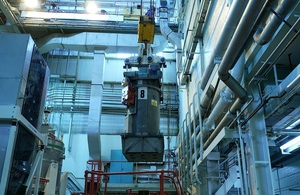Job done: Sellafield plant safely completes its mission
Seventy years of nuclear fuel reprocessing in the UK ended at the weekend.

Magnox reprocessing has been the backbone of Sellafield’s operations for nearly 60 years.
Sellafield ‘s Magnox Reprocessing Plant took its final feed of spent fuel just before midnight on Sunday 17 July 2022.
Fuel was fed into the plant’s charge machine, then dissolved in nitric acid to separate out the plutonium and uranium.
The same process which has seen approximately 55,000 tonnes of Magnox fuel reprocessed through the facility.
The historic moment brought to an end 58 years of safe operations in the plant. The building and its supporting plants will soon enter a new era of clean-out and decommissioning.
The Magnox Reprocessing Plant safely completes its mission
Generations of Sellafield workers have helped keep low carbon electricity flowing to homes and businesses through the plant’s operations.
It recycled fuel used in the UK’s first generation of nuclear power stations, known as the Magnox fleet.
The final station, at Wylfa in north Wales, closed in 2015. Since then Sellafield’s reprocessing plant has been working through the stock of spent fuel left over by these pioneering powerhouses.
In total, the plant reprocessed 54,920 tonnes of Magnox fuel. That’s more than half the volume of fuel reprocessed anywhere in the world.
Martin Chown, Sellafield Ltd chief executive officer, said:
The Magnox Reprocessing Plant has been one of the biggest success stories in British industrial history.
It has helped save 2.3 billion tonnes of carbon over its lifetime by supporting electricity generations across the UK.
I’m really proud of what we’ve achieved. When the Magnox plant started operating in 1964 it was expected to have a shelf life of 20 years. The fact it has lasted 58 years is testament to the expertise and dedication of those who have been running the plant. But now is the safe time to stop.
I want to thank everyone involved; not just in the plant itself, but all of the supporting facilities that make reprocessing possible.
There will be no job losses as a result of ending reprocessing. Anyone whose role is no longer required will be redeployed to elsewhere in the business.
We have a huge number of exciting opportunities across the business as we strive to achieve our purpose of creating a clean and safe environment for future generations.
Employee numbers in the plant will remain roughly similar during the post-operational clean-out phase, which is expected to take about 2 years.